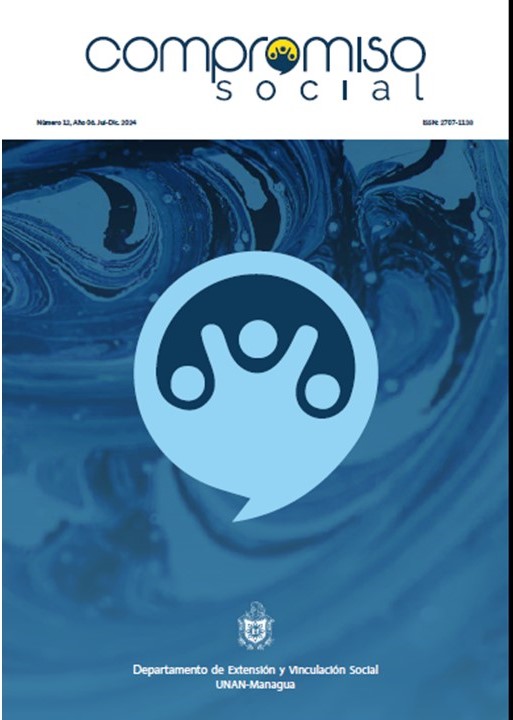Impacto de la inteligencia artificial generativa en la educación superior: un estudio comparativo
DOI:
https://doi.org/10.5377/recoso.v7i12.19650Palabras clave:
Inteligencia artificial generativa, educación superior, estudiantes y docentes, brecha digital, capacitaciónResumen
Esta investigación, realizada en el año 2023 con estudiantes y docentes de la Facultad de Ciencias y Sistemas de la Universidad Nacional de Ingeniería, explora la adopción y percepción de las Inteligencias Artificiales Generativas (IAG) en el ámbito académico. Los resultados revelan una brecha significativa en el uso de estas herramientas, con un 94% de los estudiantes y solo un 7% de los docentes reportando su utilización. Los estudiantes perciben las IAG como facilitadoras del aprendizaje, mientras que los docentes expresan preocupaciones éticas y técnicas relacionadas principalmente con la autenticidad de los trabajos y la adaptación de sus métodos de evaluación. Para abordar esta brecha, se recomienda implementar programas de capacitación docente, promover el acceso equitativo a las IAG y desarrollar lineamientos claros sobre su uso ético dentro de la facultad. Estas acciones contribuirán a una integración efectiva de las IAG en la educación en ingeniería, mejorando la calidad de la enseñanza y el aprendizaje.
2764
Citas
Bates, A. (2015). Teaching in a Digital Age: Guidelines for Designing Teaching and Learning. Tony Bates Associates Ltd. https://pressbooks.bccampus.ca/teachinginadigitalagev2/
Briñis-Zambrano, A. (2024). Beneficios y limitaciones en docentes y estudiantes universitarios salvadoreños sobre el uso de IA en procesos de enseñanza-aprendizaje. European Public & Social Innovation Review, 9,01-19. https://doi.org/10.31637/epsir-2024-368
EDUCO. (2023). Aplicaciones de inteligencia artificial (IA) en la educación. Cuaderno De Valores: El Blog De Educo. https://www.educo.org/blog/aplicaciones-de-ia-en-la-educacion
González, C. (2023). El impacto de la inteligencia artificial en la educación: transformación de la forma de enseñar y de aprender. Revista Qurriculum, 51-60. Universidad de La Laguna. https://doi.org/10.25145/j.qurricul.2023.36.03
Karsenti, T. (2016). Les technologies en éducation: état des savoirs. Presses del ‘Université du Quebec. https://www.puq.ca/catalogue/livres/technologies-education-3162.html
Padilla, R. (2019). La llegada de la inteligencia artificial a la educación. Revista de Investigación en Tecnologías de la Información, Vol. 7. e-ISSN: 2387-0893, págs. 260-270. https://doi.org/10.36825/RITI.07.14.022
Pazzanese, C. (2020). Great promise but potential for peril. The Harvard Gazette. https://news.harvard.edu/gazette/story/2020/10/ethicalconcerns-mount-as-ai-takes-bigger-decision-making-role/
Porto, S. (2023). La Inteligencia Artificial Generativa en el aprendizaje en línea: ventajas, desafíos y recomendaciones. Abierto Al Público. https://blogs.iadb.org/conocimiento-abierto/es/iag-aprendizaje-en-linea/
Regalado, O. L., Núñez-Rojas, N., Gil, O. R. L., y Sánchez-Rodríguez, J. (2024). El Análisis del uso de la inteligencia artificial en la educación universitaria: una revisión sistemática (Analysis of the use of artificial intelligence in university education: a systematic review). Pixel-Bit Revista De Medios Y Educación, 70, 97–122. https://doi.org/10.12795/pixelbit.106336
Selwyn, N. (2011). Digitally distanced learning: A study of international distance learners’ (non)use of technology. Distance Education. 32. 85-99. http://dx.doi.org/10.1080/01587919.2011.565500
UNESCO (2019). Consenso de Beijing sobre la inteligencia artificial y la educación. https://unesdoc.unesco.org/ark:/48223/pf0000368303
Vera, F. (2018). Tecnología digital para la inclusión social: Experiencia en la Universidad de Aconcagua. Universidad del País Vasco. https://rediie.cl/wp-content/uploads/UCPDF201218-43-53.pdf
Vera, F. (2023). Vista de Integración de la Inteligencia Artificial en la Educación superior: Desafíos y oportunidades. Revista electrónica Transformar. https://www.revistatransformar.cl/index.php/transformar/article/view/84/44. ISSN 2735-6302.




